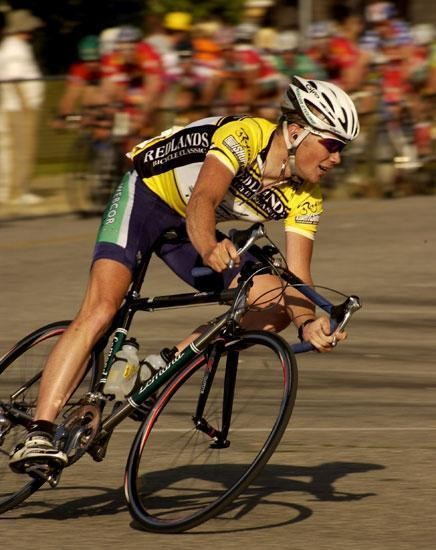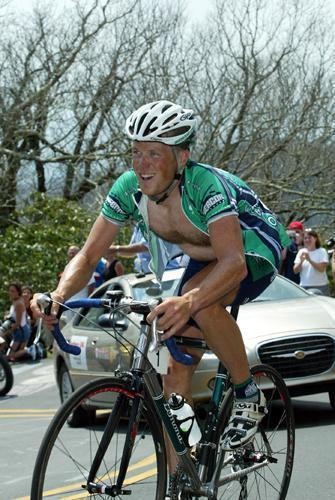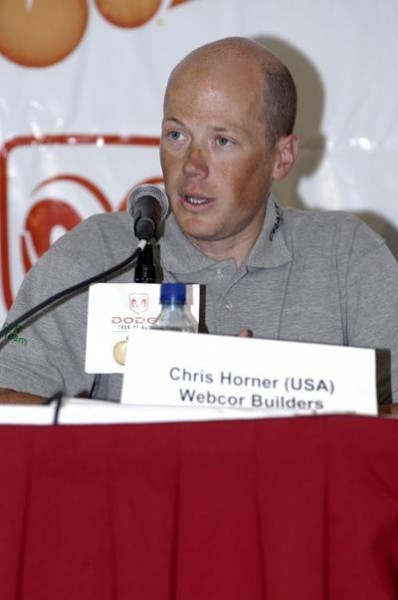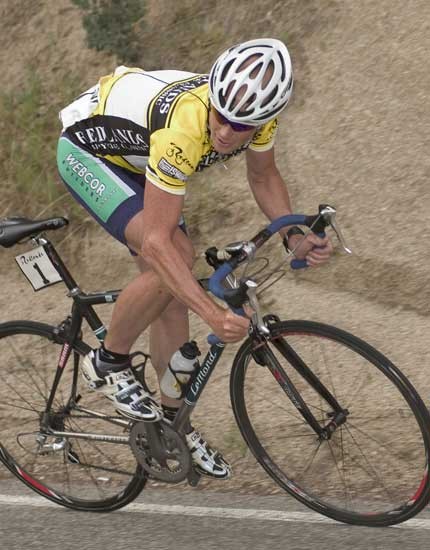Tooting his own Horner - Part I
Age: 33 Born: October 23, 1971 Turned professional: 1996 Teams: Saunier Duval (2004- ), Webcor...




An interview with Chris Horner, January 8, 2005
Chris Horner has every right to be happy with his career of late. After a significant but tumultuous stint over in Europe with Francaise des Jeux in the late nineties, including both highlights and lowlights, as well as a brief but successful return to Euro racing with Mercury in 2000, the 33 year old from Oregon has got himself a third crack across the pond with the Spanish team Saunier Duval in 2005, as Cyclingnews' Mark Zalewski reports. (See also Part II)
The veteran U.S. racer is more prepared than ever to avoid the pitfalls associated with Americans racing in Europe. In 2003, Horner dominated the U.S. circuit along with his buddies on the unstoppable Saturn team. In 2004, his job security was uncertain until a new team, Webcor Builders, surfaced and gave him a ride. However, the team was seemingly the opposite of Saturn - a team of riders that mostly hold down day jobs. But Horner led them to an extremely successful year, with a strong showing in Georgia and a win for Charles Dionne at the T-Mobile International in San Francisco.
These strong team showings, along with his own personal accomplishments, effectively punched his ticket to Europe. But the typical Chris Horner does not ever consider merely showing up a victory. In his fall campaign, he continued his strong year into the World Championships where he made the final 15 rider selection and finished eighth overall (the highest placing American). That result gave him a place on his new team's roster for the next three World Cups, and he began to move up the result lists, culminating with an 11th place at the Giro di Lombardia.
Everything seems to be lining up for what many consider the best American-based racer at the peak of his career. But can he continue his success for an entire year and in the biggest races of the world's biggest cycling stage? We tracked down Chris Horner on the west coast with his family, and even helped him avoid the chore of making dinner to talk with us.
CN: Congratulations on the new team and contract. How do you like wearing that new yellow?
CH: Ha! First off, yellow has always treated me well. I was yellow in '96 and I was yellow with Saturn - it has always treated me good so I'd like to keep the trend going and just keep yellow throughout the whole season, in the races too.
Get The Leadout Newsletter
The latest race content, interviews, features, reviews and expert buying guides, direct to your inbox!
CN: Saunier Duval has a little Saturn-thing going, with Tim Johnson last year and now you this year. Have you spoken to Tim at all about his time with Saunier Duval?
CH: Oh yeah, I wish he was staying. I haven't talked to him lately, but I did at San Francisco and he was telling me that he had had enough. And I understand...I understand what he is going though, but it's really hard. But when you leave, you want to be back there. I can't explain it any different - when you are there you want to be in the States, and when you are in the States you want to be there! So it has completely f***ed up my whole life, by going over there with Francaise des Jeux, because now I am never happy [laughs]! Before I was just happy to race my bike and make a buck, but now I'm not happy [laughs]!
CN: Do you think your previous experiences in Europe and your years of racing will make a difference in your time with Saunier Duval?
CH: I hope so. Everyone has said, 'It looks like you have finally adapted,' but I was only there for a month. And the next question is always, 'Well can you adapt?' and I'm like, 'I don't know, because I'm not there!' But my belief is - and I'm betting a lot of money on it because I took a pretty big pay-cut to go over, because I believe I can make it happen - I'm at an age now where I one-hundred percent know what I am getting into and I know how much time I have left in cycling.
CN: So you are at that point where you have the experience to 'make it happen' but also at the point that it is 'now or never?'
CH: Yeah, exactly. I'm basically now or never. I definitely have three or four years of riding, but three or four years is now or never. You really got to make it happen, because then you start getting older and no one is interested regardless.
CN: When did the talks start with Saunier Duval or other teams last season?
CH: With Saunier Duval it started pretty early because Imanol, my teammate with Webcor is friends with the Spanish director, so Imanol was pulling some favours for me trying to get me on the team over there, talking to him all the time. From that lead, I had my agent calling over there quite a bit too. In Georgia I ran into a friend that works in Europe, so he was calling Mauro Gianetti on my behalf. Then later in the year at New York I ran into Mauro Gianetti, who was my ex-teammate from Francaise des Jeux, and I was like, 'Hey, I want to get over there!'
But I don't know if that helped or hurt, because he was my teammate on Francaise des Jeux [laughs]! I didn't have the greatest year over there. I had some results that showed that this guy can ride a bike, we just have to figure out how to get it more consistent. At one point in time, in '98 I was going to make the Tour team because I was sitting in sixth at Midi Libre, and had an excellent time trial and was climbing good. And they could tell I wasn't hurting after the races. But then I fell and broke my wrist on the last stage, so I missed that opportunity.
Then in '97 I had a good result in Plouay - which is a good result, you can't just fake that kind of result. After that in '99 I had some results, and in 2000 with Mercury I had a really good Criterium International. I've shown glimpses here and there, but I'd never been able to put together a good run like I did this year with World Championships, Paris-Tours, Milano-Torino and Lombardy. That was three solid weeks!
CN: What do think was the difference for you at those major races?
CH: I honestly don't believe I wasn't doing anything I wasn't capable of doing in '97. I truly believe I was capable of having those rides [before] and I was just not adapting to the lifestyle. If you look at those results that I had in those years, whenever I was back in the States I was on great form, and I was back to winning races. Once I got back to the States, my head got right and I was training the way you need to train and eating the way you need to eat. All that is related to how your head is. But I fully believe that those years I had the same kind of form I had this year, and I couldn't put it together off the bike to be able to put it together on the bike.
CN: It's a significantly different Europe for American riders now than when you were last over there, with a lot more Americans living and racing, particularly based out of Spain. Do you plan on taking advantage of that as far as living and training, or will you go it alone?
CH: I had that in Nice and it really didn't do a lot for me because we were always on different schedules. I know Tom Danielson pretty good and I really like Christian Vandevelde, so I am certain we could all get along really good, but the other guys I really don't know very well. I haven't spent much time with them and so I don't know if it would help to be in those areas in Spain. I think what I really want to do is to adapt to the lifestyle and become Spanish! Maybe with the exception of eating at eleven every night - I don't know if I could ever adapt to that [laughs]! But I really just want to get over there, meet some guys who ride bikes, learn the language and adapt the best I possibly can. And I think that will help me perform the best.
CN: Oh yeah, and how is your Español?
CH: Uh...I was doing some pretty decent studying for a while, and then once we got into December and the kids are on vacation it's been bad. But it's coming along - by no means can I talk Spanish at the moment, but like I said the difference is now I am older, I won't mess around and I will get it done! Give me a few months and I will be at least good enough to get by on the bike lingo.
2004 - A good year
CN: What are your highlight moments from this past season?
CH: Pretty hard to highlight any one part because the whole season was pretty phenomenal. Not just my performance, but the team as a whole. And of course, if you are really part of a team you don't need to win to have a good day, someone from the team can win like in San Francisco. That was a huge highlight for me - that was big! The whole way that race went down, everyone thought the race was over. The way the team rode at that race, it has to go down as a highlight.
The next highlight to that was the win at Pomona. Because with that win I realized these guys can ride the bike, and we are going to win a lot of stuff all year. But it wasn't until that road race stage at Pomona that - I mean I knew I was going to win race, because you can win without a team, but it's very difficult to win without a team - and at that moment I realized that I got a team around me and that these guys are riding incredible.
CN: Any goals missed from the past season?
CH: The only thing was Olympic Trials honestly. And I really didn't get anything accomplished at Philly, and I had a good ride - what I believed should have brought me a win somewhere - but I didn't even place good at any of those races. So those would be the only two low points. Olympic Trials, I was sick the whole week leading up to it - I thought the ride was great again and the team rode fantastic, but it was just negative tactics. I expected that being sick I didn't have the form to overcome those kind of tactics.
The Athens Olympics
CN: Speaking of the Olympic Trials, what are your thoughts on the whole process?
I don't have any problem with that process. They picked a hard course, they did everything they could to pick a guy who could ride good, and they got a guy who could ride good. Jason McCartney can ride a bike, there is no disputing that. A lot of people came down hard on me for comments I made after the race, but I never once in any comment say he was a bad rider. All I ever said was that he was the worst guy in the bunch. Which was true, he was having a bad day, that wasn't one of his good days, he was cramping. Some people went too far into my comment when I said 'He was the worst guy in the bunch,' they took that as 'He is a bad rider.' That's not what I said. When I make a comment on the race that day, I am speaking of a rider's ability that day. Unless I say, 'This rider sucks!' that's all it means. I hands-down believe he is a quality rider. He'd have to be to even be in that bunch.
CN: What about the other selections for the team? Do you think the right people were chosen for the right reasons?
CH: I thought everybody got selected the way they should. Fred said some stuff that they were getting more stage race riders than one day riders. But who can you argue with? Who there is a bad rider? Bobby is a great rider. Tyler is a great rider. Levi is a good rider, and he's the guy who took Lance's spot. Steve Johnson called me before he even announced it and he said they were going to take Levi, and I said, 'Ya sure, he's coming from the Tour!'
And I didn't have any problems with Jason going. Yeah, I was frustrated with the way the tactics went for sure, but that's bike racing. That is once beautiful thing about bike racing - you don't have to be the best guy on form that day to win a bike race. I've said that many times before of myself, that when I haven't been in good form I've won a lot of bike races when I haven't been the best guy in the race, because I did the right things tactically. That particular day there was nothing I could have done right, because everyone was just marking me too much.
CN: What are your thoughts about the overall U.S. performance at the Olympics?
CH: I think Fred would have been an ideal rider to have at that race. Would he have won the thing? Probably not. You gotta look at his results. I believe him to be a guy who can win races, but he has to win races with everything being right. I don't know if he could have followed Bettini's wheel. Could he have won the sprint? Absolutely. But the way Bettini won...do you change the process over to put one guy on? I believe the way USA Cycling did it, they had a good criteria, they picked the riders that were strong, and you can only take five guys - that's the way it is.
CN: Do you plan on being around long enough for another go at the Olympics?
CH: I think I'll be around, it's only four years away, so I would think that looking at the other guys in history, I would say that four years is about the last time I'd be on that form where you can stand a chance of doing something at the Olympics. Of course, by then, it might be easier to make the team then, because you never know who will be around. At this point in time, Tyler might be gone with what he is going through. Bobby could end up retiring, and other guys could quit because they are making good money and they'd had enough. So who knows, I could be the top choice in four years!
Click here for Part II of our interview with Chris Horner, where he talks about the Hamilton case, the state of cycling in the USA, and his goals for 2005.